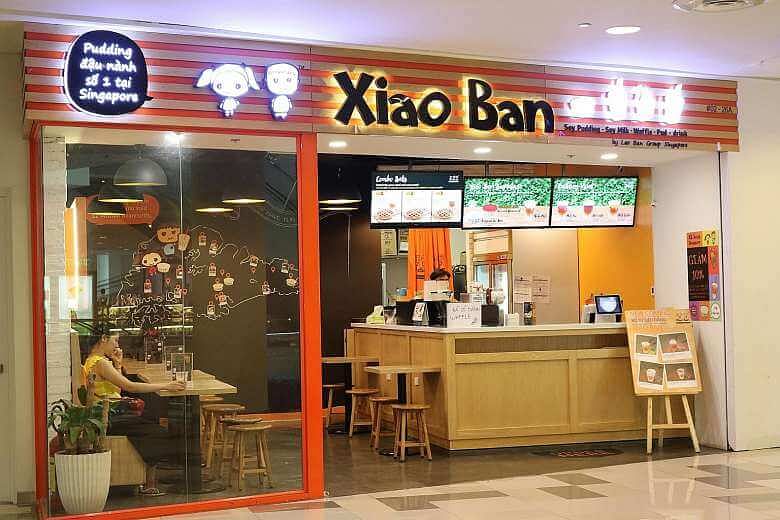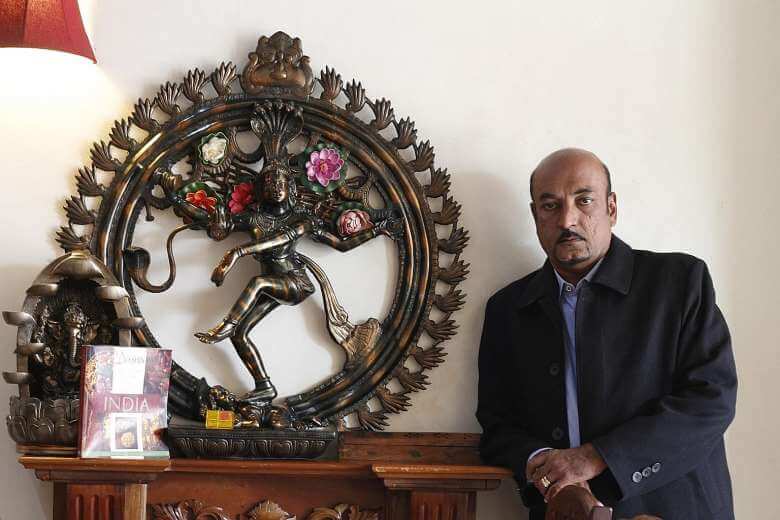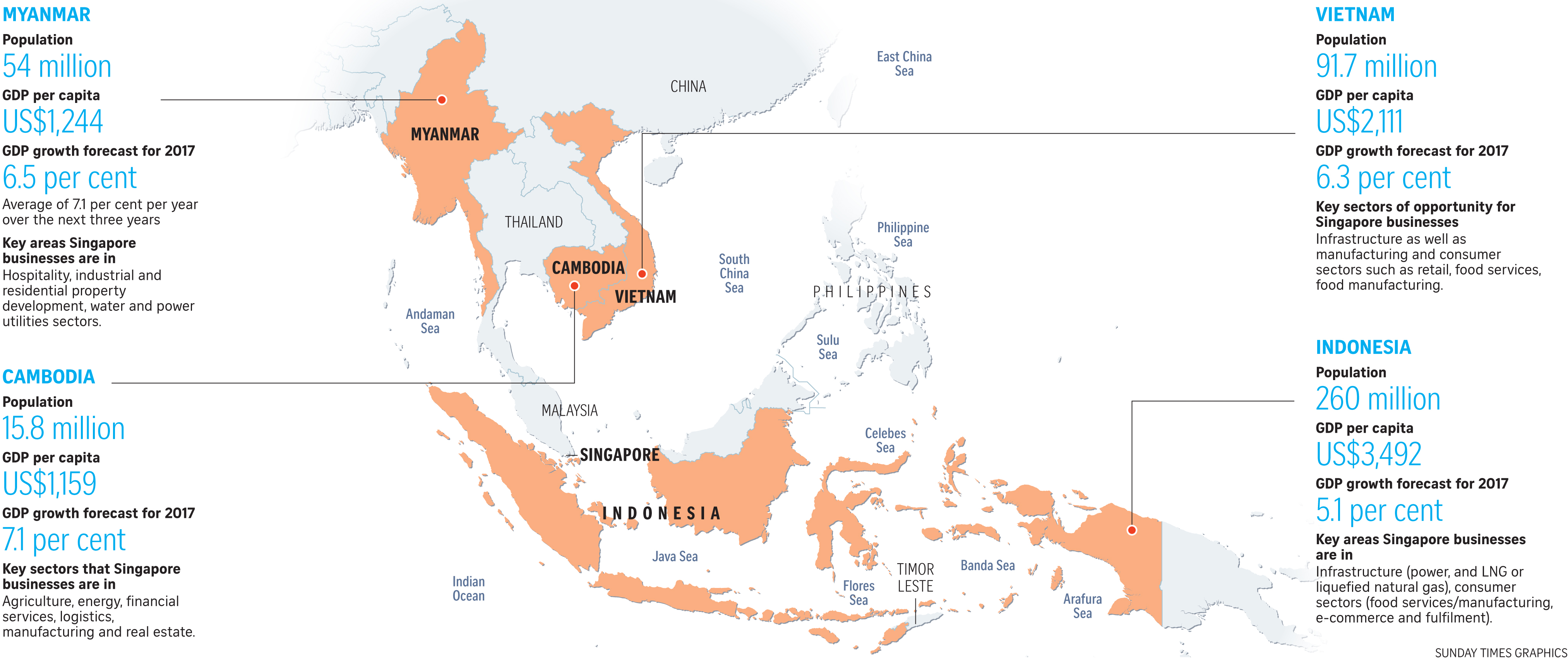Going regional
Going regional: Singapore businesses seize opportunities in South-east Asia
Singapore businesses heading abroad can take advantage of sustainable growth in S-E Asia
As Singapore goes through economic restructuring, a key strategy for growth is for its people and businesses to deepen links with the region.
The Committee on the Future Economy made this point in its report in February, and Prime Minister Lee Hsien Loong reiterated the message to Singaporeans he met in Ho Chi Minh City last month.
"If we are to prosper, we have to be able to go overseas and venture and take opportunities and uncertainties," Mr Lee said.
A good number of Singaporeans have done just that.
Mr Ivan Tan, group director for South-east Asia and Oceania at International Enterprise (IE) Singapore, which helps businesses seeking to venture abroad, tells The Sunday Times: "It is critical for Singapore companies to go global to find new revenue streams and sustain growth, especially with the current economic climate."
Singapore's fellow Asean members remain a first stop for many small and medium-sized enterprises (SMEs) expanding overseas.
Economic growth in South-east Asia is sustainable, and supported by such factors as a young population and a rising middle class, the availability of natural resources and rapid urbanisation, says Mr Tan.
"Singapore companies can take advantage of the abundant and cost-competitive manpower pool and relatively lower land costs," he points out.
"We also see investment opportunities to plug the infrastructure deficit, to address consumer needs in areas such as food and beverage, healthcare and education, and in the fast-growing digital economy, for instance, in e-commerce."
"Even though opportunities are immense, there is also strong competition to contend with," he adds.
Insight speaks to Singaporeans who have ventured to Indonesia, Myanmar, Vietnam and Cambodia, and done well for themselves, while opening up doors for others and contributing to the development of their host countries.
Indonesia: Getting a head start in pre-school sector

When education consultant Josephine Tan moved to Jakarta 12 years ago to work at a Singapore-run pre-school, she got a culture shock. "The pace was really slower, and I couldn't cope. Why was everybody so relaxed?" she tells The Sunday Times. "But the space and opportunity to thrive and make mistakes were fantastic."
Thrive she did. Today, she runs her own pre-school, Learning Hands, in North Jakarta. Set up two years ago with an Indonesian investor, it offers a Singapore-style curriculum to middle-class Indonesians, who pay $4,000 a year in fees.
Singapore is the largest investor in Indonesia, with its companies pumping in US$7.1 billion (S$10 billion) in the first nine months of last year. While many big companies are represented, there are also many small players like Ms Tan, 49.
Myanmar: A learning journey, from car batteries to cyclones

The year was 1997 when Mr Argus Ang stocked up on palm leaf fans to get himself though Yangon's searing summer. Electricity was intermittent then in a military-ruled Myanmar weighed down by Western sanctions. Cars were a luxury and petrol, rationed.
Strangely enough, there were many shops selling car batteries.
The curious business administration graduate in his 20s from the National University of Singapore soon found out why - batteries were connected to inverters to keep electrical items running during blackouts.
Vietnam: Soya bean cafe rides on growing consumer boom

A leafy tree grows outside the bright orange Ho Chi Minh City storefront with a name familiar to Singaporeans - Xiao Ban soya snack cafe. The tree partially obscures it and the shop next door.
Just a few weeks after opening the outlet last year - the company's third in Vietnam - Mr Picasso Terrence Hong, group chief business officer for Asia-Pacific, was surprised when a worker turned up to trim the tree. "He said we have to pay for the tree pruning. If we want to trim more, we have to pay more," says the Singaporean entrepreneur.
The worker said he would be back the next month, but returned within a week to trim the tree again and request more payment. Curiously, the shop next door, which is owned by a local, does not have to pay, says Mr Hong.
Cambodia: Striking out on his own to open an eatery... or two

When Mr B. Pannirselvam left Singapore for Cambodia in 1999, it was to help out a friend whose Peranakan restaurant in the capital of Phnom Penh was failing.
Thirsty for new challenges, Mr Pannirselvam, who was then managing a restaurant here, saw it as a chance to strike out on his own.
He bought the eatery and, within a year, had turned it into a bustling Indian restaurant, which he later sold for a profit, sinking the funds into a new venture.
Join ST's WhatsApp Channel and get the latest news and must-reads.
A version of this article appeared in the print edition of The Sunday Times on April 02, 2017, with the headline Going regional: Singapore businesses seize opportunities in South-east Asia. Subscribe

